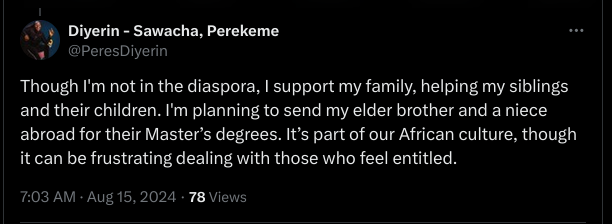African Twitter Erupts in Defense of Family Obligations
 |
| [Image Credit: https://zikoko.com] |
There was an uproar on X.com when an X.com user using the handle @OneJoblessBoy posted a TikTok video of Kenyan comedian Elsa Majimbo criticizing the African cultural expectation of supporting extended family members. Her remarks sparked widespread debate across the platform, highlighting the complexities of family responsibilities in African societies.
Remittances have long been a cornerstone of economic survival for many African families. According to the World Bank: "Remittances are a lifeline to low- and middle-income countries and an effective way to alleviate poverty because they go directly to families.." The act of sending money isn’t merely a financial transaction; it embodies deep-rooted cultural values of family, community solidarity, and responsibility. However, the narrative presented by Elsa Majimbo rejected these values in favor of a more individualistic approach, leading to significant debate online.
The Controversial Statement
In the video, Majimbo expressed her disdain for the practice of sending money back home or to extended family members, stating:
"Sending money back home or to your extended family is such a common African practice that I absolutely hate. I saw my dad doing it, and I don't even know any of my extended family. I saw him doing it with his brothers, with his sisters, with his grandparents, parents—like everyone in the family. As long as you have a job, they expect you to share that money accordingly, and that's just something I will not be participating in."
Her comments quickly drew attention, igniting a firestorm of responses from users across the platform.
The African Twitter Reaction
In a matter of hours, the tweet gained traction, and reactions poured in from all corners of the continent. The overwhelming sentiment on African Twitter was one of disapproval. Users voiced their opinions passionately, emphasizing the importance of community support and the historical context of why such practices exist.
Many users voiced their discontent with Majimbo’s perspective. One user, with the handle @drop_projects, remarked:
"This is actually pretty disgusting. They are poor, not lazy. Kenyans make less than $3.20 a day on average, and almost two-thirds of the population lives below the poverty line. This level of selfishness, individualism, and ignorance is a byproduct of Western influence."
Another user, @AdanniaT, added:
"The problem isn't helping every now and then. It's more about turning family in the diaspora into their lifeline and ATM, calling for help for everything. Africans should rise and hold their governments accountable. The diaspora cannot fill the gap to be their sole providers when their governments fail to create jobs for them."
 |
Further emphasizing the importance of family support, user @MonnAbraham stated:
"Most of the people in the diaspora were helped by their families to get there. They also depended heavily on the same family when they were in Africa. That’s how the family system in Africa works. We depend on each other."
Lastly, user @PeresDiyerin shared:
"Though I'm not in the diaspora, I support my family by helping my siblings and their children. I’m planning to send my elder brother and a niece abroad for their Master’s degrees. It’s part of our African culture, though it can be frustrating dealing with those who feel entitled."
The backlash against Elsa Majimbo's comments underscores a broader conversation about cultural expectations and the vital role of family support in African societies. The collective sentiment on X reveals a deep-rooted understanding of family responsibilities and interconnections.





Comments
Post a Comment